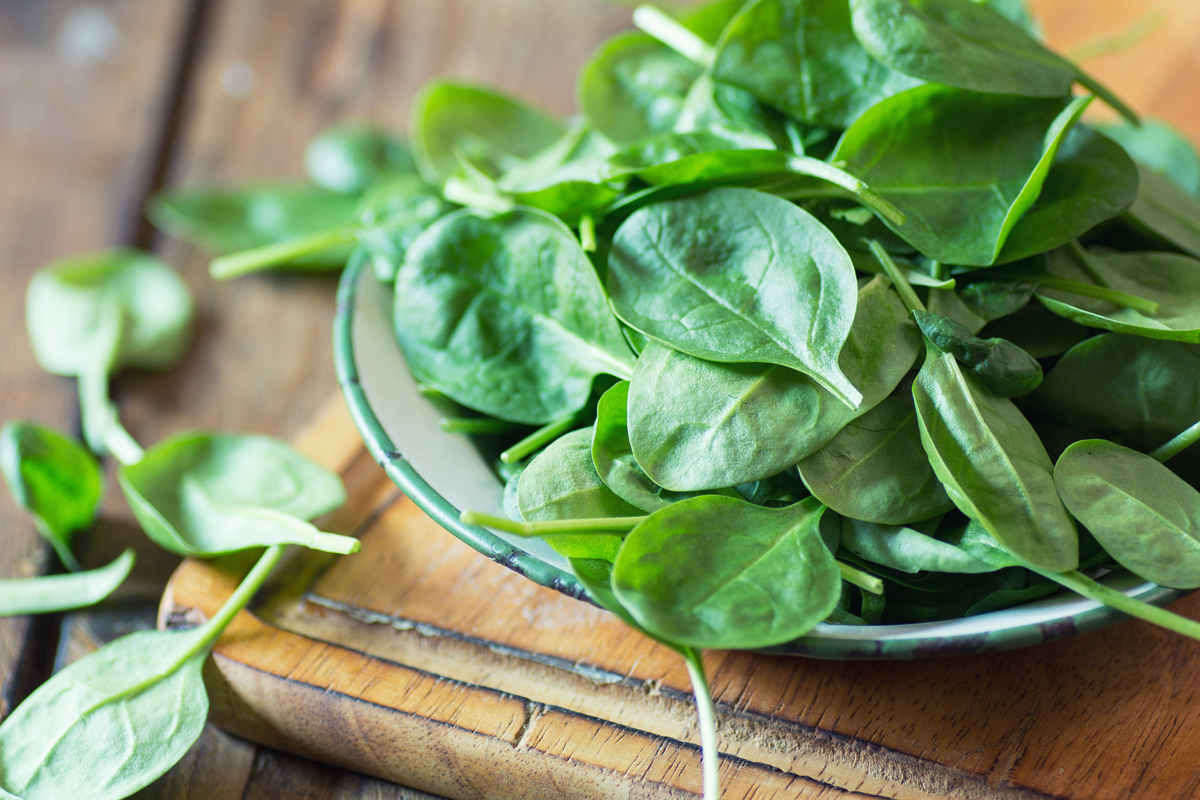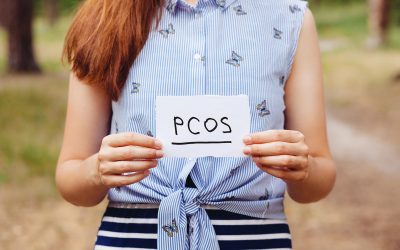Written by: Ruby Booras, DNP, ARNP, FNP-BC
Nutrition with Polycyctic Ovary Syndrome
Like many chronic diseases, Polycystic Ovary Syndrome (PCOS) is greatly influenced by personal habits and lifestyle factors – including our diet. Research has shown that the food we eat plays a major role in symptom management, fertility, and life-long health and for those with PCOS[1]. Diet influences many of the underlying issues associated with PCOS, namely – insulin resistance, inflammation, and androgen activity (like testosterone)[2], [3], [4]. Pretty exciting right?! Sure, it is! It’s exciting because it means we can take back control – of our hormones, our bodies, and our health, simply by optimizing our diet.
But what about genetics, you say? Your mom, your sister, your aunt, your brother’s great-aunt’s dog’s cousin all have PCOS? You’re right – genetics is a foundation piece for the development of PCOS, but there’s more to the story [5], [6]. Simply put, your genes may predispose you to PCOS but your genes are not your destiny. Your environment, habits, exposures, and lifestyle behaviors (including your nutrition) can influence how and to what extent your genes are expressed [7]. #epigenetics.
But what is the right “diet” for PCOS?
Diet fads are incredibly common these days, (we see you keto, paleo, low-carb etc.) and it can be an overwhelming task to filter through all the information out there in order to find the most credible and evidence-based recommendations. A search on a popular search engine (starts with a ‘G’ and rhymes with doodle) using the phrase “best diet for PCOS” yields 11.4 million results! No wonder it can be so hard to know what is best.
So, what does the latest research actually say? It turns out, the best diet for PCOS is the best diet for essentially all leading chronic diseases – including heart disease, diabetes, and cancer. What’s that you ask? A whole food, plant-based diet that is low in fat [1], [4], [8], [9]. #wfpb #plantsforthewin
Looking at the PCOS diet from a science perspective…
Have you ever heard that “PCOS is like diabetes of the ovaries”? That is because the majority of those struggling with PCOS have some level of insulin resistance – whether they are lean or obese [PCRS]. This means that their bodies make insulin, but they can’t use it properly. Insulin is a hormone that acts kind of like a tour guide with a special key, which is used to “unlock” our cells and escort glucose (aka blood sugar) in so it can be used as fuel. #howchivalrous
According to Mastering Diabetes, insulin resistance is caused by the build-up of excess dietary fat in body tissues that were not designed to house large quantities of fat [12] [13]. When there is too much fat in these tissues it interferes with insulin’s ability to help glucose into the cell – it essentially gums up the “lock” (aka insulin receptor) so the key (aka insulin) won’t fit, #scienceanaologies. Glucose and insulin levels rise, which leads to oxidative stress, blood vessel damage, inflammation and hormone imbalance. This results in overproduction of androgens by the ovaries, which in turn impairs ovulation (aka egg release), and can lead to irregular periods, infertility, abdominal fat accumulation, difficulty with weight loss, acne, thinning scalp hair, and excess face and body hair…. you get the picture [10], [14].
Unfortunately, it doesn’t stop there. Those with PCOS are at higher risk for developing type 2 diabetes, gestational diabetes, high blood pressure, heart disease, high cholesterol, sleep apnea, anxiety, depression, and disordered eating [Barnard]. They also have a higher risk for miscarriage and other pregnancy complications like gestational diabetes, pre-eclampsia, and preterm delivery [15].
Many low-carb diets claim to be beneficial for PCOS. They base this on the fact that when you eat less carbs your blood sugar doesn’t go up as high and therefore insulin needs are reduced. That’s true, but it doesn’t really address the root cause of the problem – insulin resistance. In fact, low-carb diets that lean heavily on animal proteins tend to be exceptionally high in saturated fat and can actually worsen insulin resistance. Have you ever heard the saying “don’t mop the floor when the sink is still overflowing”? #sciencenerdsloveanaologies. The sink needs to be fixed before we can take care of the mess it made. Wait, sinks? Weren’t we were talking about keys and locks? Okay, okay back to the previous analogy. We need to un-gum-up (#nerdscreatewords) the lock so the key fits again. Which means…. you guessed it – we need to focus on reducing excess fat accumulation in the muscle and liver so insulin can work properly again. Glucose is brain and body fuel and (the right kind) of carbohydrates are not the enemy. Even if it sounds like a good idea, cutting carbs is not the ticket to a healthier diet for PCOS.
Many of the healthiest foods are full of complex carbohydrates, fiber and über beneficial phytonutrients. Vegetables, fruits, whole-grains, nuts, seeds, and legumes are jam-packed with vitamins, minerals, antioxidants, and anti-inflammatory properties. In fact, a whole-food, plant-based diet that is low in fat has been shown to not only prevent and stop the progression of heart disease and diabetes, but to reverse them completely [16]! If that weren’t enough, it is thought that approximately 40% of all cancers can be prevented by following a healthy lifestyle and diet that includes whole-food, plant-based food sources and minimizes meats, dairy, and processed foods [17]. But wait! There’s more! Diets emphasizing complex carbohydrates, like whole-grains, legumes, and nuts, in place of refined carbohydrates, have high levels of the key nutrient inositol hexaphosphate [10]. #hexa-what-now? Inositol has been shown to improve insulin sensitivity, decrease androgen levels, and improve ovulatory function in both lean and obese people with PCOS [18], [19], [20].
Conversely, diets founded on ultra-processed foods, meats, eggs, and dairy contain high amounts of saturated fat, cholesterol, and other damaging properties, which promote oxidative stress, hormone disruption, and inflammation and have been linked to a higher rates of heart disease, type 2 diabetes, stroke, and cancer [13], [16], [20].
Breaking down the PCOS diet plan:
If you want a diet that can prevent our nation’s leading causes of disease and death but can also aid in weight loss, increase ovulation, regulate menstrual cycles, promote fertility, clear up acne, and decrease scalp hair loss and facial/body hair growth – you’re in luck. A well-balanced diet consisting of a variety of whole-plant foods and minimizing (or eliminating) animal products and processed foods is not only best for people with PCOS; it’s best for all people – including those who are trying to conceive and those who are pregnant. #plantpoweredbabies.
Let’s break it down some more:
#listsaregreat
- Eat whole foods
- Choose foods that are as close to their natural state as possible (think a whole apple instead of apple juice, whole-grain steel-cut oats in place of instant oats).
- As Michael Pollen said, “Eat plants, not food that was made in a plant,”. #fatherofplantbasednutrition
- Avoid refined white foods (e.g. white bread, rice, pasta) as they are highly processed and lack fiber.
- Maximize the color on your plate:
- No those neon orange chips, and blue fruit gummy things don’t count. Plant foods with the most vibrant color tend to be highest in antioxidants and phytonutrients (think berries, leafy greens, orange sweet potatoes etc.).
-
- Focus on fiber:
- Fiber comes from plants. In order to maximize your fiber intake, you have to eat more plants. Fiber promotes gut health by keeping your microbiome healthy (aka those friendly bacteria in the gut) [22], [23]. Your gut is a major source of hormone regulation btw, #secondbrain. It improves insulin sensitivity and lowers cholesterol. It keeps you full longer and aides in weight loss efforts. Diets high in fiber (read: plants) have the lowest rates of heart disease and cancer [17]. What’s not to love!
- Cook your own food:
- Home cooking is a great way to learn how to cook, prepare and enjoy a variety of whole foods. It is also the best way to control what and how much food you are getting.
- Eat mindfully:
- Be present in the moment. Focus on the senses, the experience, and the enjoyment of your meal.
- Avoid screen time, work, and other distractions during meals.
- Set aside designated time to eat:
- Try to avoid eating on the go. Yep – this is a hard one for a lot of people.
- Change it up:
- Strive to eat a variety of fresh fruits and vegetables, whole grains, and health fats in order to get the best balance of vitamins, minerals, antioxidants, and other beneficial micronutrients.
- Add spice to your life:
- Herbs and spices are super high in antioxidants and have amazing anti-inflammatory properties and they make food more fun and flavorful. Add cinnamon to your oatmeal, turmeric to curries, cilantro to your walnut tacos.
- Don’t drink your calories:
- Water should be your beverage of choice. Add some fresh citrus fruit, berries, mint leaves, or cucumber for flavor if you want.
- Many teas are high in antioxidants, but some are not recommended for those trying to conceive or pregnant so make sure to check with your provider.
- Choose healthy fats:
- Examples include avocado, nuts, and seeds. Did you know ground flax and chia seeds are excellent plant sources of omega-3 fatty acids!
- Consider intermittent fasting:
- There is emerging evidence that engaging in periodic intermittent fasting can aid in weight loss and helps improve insulin sensitivity. Check with your provider if you’re trying to conceive. [24], [25]. Remember to consult with your provider if you’re trying to conceive.
- Have fun:
- If eating this way is new to you it may be a bit intimidating. Many people did not grow up eating primarily whole, plant foods. The learning curve can feel steep at first. It may feel different, but it should not feel restrictive or boring – far from it. Many people who have switched to a whole food plant-based diet are amazed to find the variety of abundant, flavorful, and nourishing food options available to them. What’s more, the knowledge that you are fueling your body with the very best nutrition is empowering and liberating!
- Focus on fiber:
Bon Appetit!
Helpful Resources:
Nutritionfacts.org – How to Treat PCOS With Diet
Forksoverknives.com – I have PCOS What Should I Eat?
Masteringdiabetes.com – The PCOS Diet Ultimate Guide
References:
- Barnard ND. Your Body in Balance: The New Science of Food, Hormones, and Health. Grand Central Publishing; 2020.
- Moran LJ, Ko H, Misso M, et al. Dietary composition in the treatment of polycystic ovary syndrome: a systematic review to inform evidence-based guidelines. J Acad Nutr Diet. 2013;113(4):520-45. [PMID:23420000]
- Stamets K, Taylor DS, Kunselman A, et al. A randomized trial of the effects of two types of short-term hypocaloric diets on weight loss in women with polycystic ovary syndrome. Fertil Steril. 2004;81(3):630-7
- Berrino F, Bellati C, Secreto G, et al. Reducing bioavailable sex hormones through a comprehensive change in diet: the diet and androgens (DIANA) randomized trial. Cancer Epidemiol Biomarkers Prev. 2001;10(1):25-33. [PMID:11205485]
- Vink JM, Sadrzadeh S, Lambalk CB, et al. Heritability of polycystic ovary syndrome in a Dutch twin-family study. J Clin Endocrinol Metab. 2006;91(6):2100-4. [PMID:16219714]
- Rosenfield, Robert L., and David A. Ehrmann. “The Pathogenesis of Polycystic Ovary Syndrome (PCOS): the Hypothesis of PCOS as Functional Ovarian Hyperandrogenism Revisited.” Endocrine Reviews, 37, no. 5, 2016, pp. 467-520.
- Franks S, McCarthy MI, Hardy K. Development of polycystic ovary syndrome: involvement of genetic and environmental factors. Int J Androl. 2006;29(1):278-85; discussion 286-90. [PMID:16390494]
- Hahn S, Tan S, Elsenbruch S, et al. Clinical and biochemical characterization of women with polycystic ovary syndrome in North Rhine-Westphalia. Horm Metab Res. 2005;37(7):438-44. [PMID:16034717]
- Turner-Mcgrievy GM, Davidson CR, Wingard EE, Billings DL. Low glycemic index vegan or low-calorie weight loss diets for women with polycystic ovary syndrome: a randomized controlled feasibility study. Nutrition Research. 2014;34(6):552-558. doi:10.1016/j.nutres.2014.04.011.
- Barnard ND. Polycystic Ovary Syndrome: Nutrition Guide for Clinicians. Polycystic Ovary Syndrome | Nutrition Guide for Clinicians. https://nutritionguide.pcrm.org/nutritionguide/view/Nutrition_Guide_for_Clinicians/1342095/all/Polycystic_Ovary_Syndrome#ref16390494. Accessed September 9, 2021.
- Mortada, Rami, and Tracy Williams. “Metabolic Syndrome: Polycystic Ovary Syndrome.” FP Essentials, 435, 2015, pp. 30-42.
- Khambatta C. How to reverse insulin resistance using your diet. Mastering Diabetes. https://www.masteringdiabetes.org/reverse-insulin-resistance-presentation/. Published October 10, 2020. Accessed September 8, 2021.
- Khambatta C, Barbaro R. Mastering Diabetes: the Revolutionary Method to Reverse Insulin Resistance Permanently in Type 1, Type 1. 5, Type 2, Prediabetes, and Gestational Diabetes. Penguin Publishing Group; 2020.
- Rosenfield RL, Ehrmann DA. The Pathogenesis of Polycystic Ovary Syndrome (PCOS): The Hypothesis of PCOS as Functional Ovarian Hyperandrogenism Revisited. Endocr Rev. 2016;37(5):467-520. [PMID:27459230]
- Foroozanfard F, Asemi Z, Bazarganipour F, Taghavi SA, Allan H, Aramesh S. Comparing pregnancy, childbirth, and neonatal outcomes in women with different phenotypes of polycystic ovary syndrome and healthy women: a prospective cohort study. Gynecological Endocrinology. 2019;36(1):61-65. doi:10.1080/09513590.2019.1631278.
- Storz MA. Will the plant-based movement redefine physicians’ understanding of chronic disease? The New bioethics : a multidisciplinary journal of biotechnology and the body. 2020;26(2):141-157. doi:10.1080/20502877.2020.1767921
- Clinton SK, Giovannucci EL, Hursting SD. The World Cancer Research Fund/American Institute for Cancer Research Third Expert Report on Diet, Nutrition, Physical Activity, and Cancer: Impact and Future Directions. J Nutr. 2020;150(4):663-671. doi:10.1093/jn/nxz268
- Bizzarri M, Carlomagno G. Inositol: history of an effective therapy for Polycystic Ovary Syndrome. Eur Rev Med Pharmacol Sci. 2014;18(13):1896-903. [PMID:25010620]
- Gerli S, Mignosa M, Di Renzo GC. Effects of inositol on ovarian function and metabolic factors in women with PCOS: a randomized double blind placebo-controlled trial. Eur Rev Med Pharmacol Sci. 2003;7(6):151-9. [PMID:15206484]
- Nestler JE, Jakubowicz DJ, Reamer P, et al. Ovulatory and metabolic effects of D-chiro-inositol in the polycystic ovary syndrome. N Engl J Med. 1999;340(17):1314-20. [PMID:10219066]
- Barnard ND, Leroy F. Children and adults should avoid consuming animal products to reduce risk for chronic disease: YES. The American journal of clinical nutrition. 2020;112(4):926-930. doi:10.1093/ajcn/nqaa235
- Sakkas H, Bozidis P, Touzios C et al (2020) Nutritional status and the influence of the vegan diet on the gut microbiota and human health. Medicina (Kaunas) 56: 88
- InterAct Consortium (2015) Dietary fibre and incidence of type 2 diabetes in eight European countries: the EPIC-InterAct Study and a meta-analysis of prospective studies. Diabetologia 58: 1394–408
- Cheng CW, Villani V, Buono R et al (2017) Fasting-mimicking diet promotes Ngn3-driven β-cell regeneration to reverse diabetes. Cell 168: 775–88
- Larson-Meyer DE, Heilbronn LK, Redman LM et al (2006) Effect of calorie restriction with or without exercise on insulin sensitivity, beta-cell function, fat cell size, and ectopic lipid in overweight subjects. Diabetes Care 29: 1337–44





